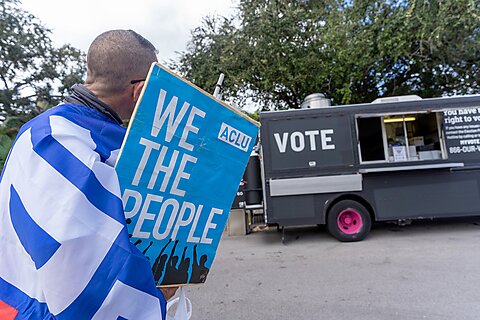The federal Voting Rights Act can be viewed, in part, as implementing the Fifteenth Amendment’s ban on denying or abridging the right to vote based on race. But in practice, the law goes much further than that, which is one reason it remains controversial. VRA lawsuits pursuing the logic of “disparate impact” often force localities to discontinue old election rules that were in no way motivated by race. Moreover, as the Supreme Court has noted with disapproval, the law’s informal pressure to equalize representation numbers can create incentives for localities to begin sorting and discriminating by race in election matters—stretching district lines to engineer desired racial outcomes, for example—and that in itself can be unconstitutional.
Meanwhile, as a practical matter, VRA lawsuits and their threat give private litigation groups real leverage over local election administrators, who frequently offer concessions not required by law rather than be dragged through the cost and uncertainty of the court process.
For these and other reasons, the Supreme Court in a series of cases has seen fit to trim back somewhat the breadth of VRA liability. Opponents, led by the private litigation groups whose practical clout derives from the law, have cried foul and pushed for Congress to expand the law. While those bills may have stalled, they have enjoyed more success in a campaign to get states to enact their versions of the VRA.
Depending on the drafting, these mini-VRAs in some cases restore elements struck from the national VRA by federal courts, sometimes extend the laws in new directions, and sometimes create new standards of proof more favorable to complainants. (Details here, courtesy National Conference of State Legislatures.) So far eight states have enacted these junior VRAs: California, Connecticut, Illinois, Minnesota, New York, Oregon, Virginia, and Washington. Michigan’s legislature narrowly failed to pass such a bill this year, and pushes are underway in states like Maryland, New Jersey, and Colorado.
Now a New York state judge has ruled that that state’s mini-VRA violates the US Constitution. The case arose from a suit against the Town of Newburgh, a municipal entity that is historically and legally distinct from the adjoining City of Newburgh. Like many towns, it had gotten sued over a longstanding practice of holding elections at large, that is to say, with all candidates running town-wide rather than in districts or under other arrangements that might enable a minority of voters to win one or more seats by voting together. The suit was filed under the John Lewis Voting Rights Act of New York (or “NYVRA”), which prescribes standards friendlier to plaintiffs than the federal law. In particular, it dispenses with the requirement, in applying what election lawyers call the Gingles standard, that a minority population be shown to be geographically cohesive. Also, it treats more favorably so-called “coalition” claims that could allow plaintiffs to combine into a single winner claims that would have failed separately on behalf of different minority groups.
Those were critical changes, reasoned Judge Maria Vazquez-Doles, because the federal standards had survived Supreme Court scrutiny over a series of cases only because of the considered judgment of a relevant body of justices that the compromise formulas being approved did not go so far as to induce localities to infringe the equal protection rights of other groups, including groups not represented in the courtroom. By striking the balance in a more plaintiff-friendly place, on this logic, New York was ensuring that to comply with state law towns would have to abridge other rights that the court had made clear were of constitutional stature.
In the 2020 case Higginson v. Becerra, Cato joined the Pacific Legal Foundation and other groups in an amicus brief arguing along similar lines that California’s state VRA violated equal protection in the ways it authorized racial dilution claims that would be rejected under the federal VRA. The high court denied review of a Ninth Circuit ruling upholding the California law.
Judge Vazquez-Doles’s decision in Clarke v. Town of Newburgh is the subject of an expedited appeal to the New York court system’s Second Department, and the result may be published soon. Whatever happens, there are other reasons for state lawmakers to hesitate before creating new state VRAs. In Michigan, reported Hayley Harding at VoteBeat, county administrators testified to their alarm at the “heavy burden on local clerks” the bill’s ambitious requirements would impose. Speaking to a legislative committee on behalf of the Michigan Association of Municipal Clerks, Lansing clerk Chris Swope said, “If you had told me a year ago that I would ever testify in opposition to anything called a voting rights bill, I would have laughed in your face.” He went on to flag “concerns about penalties against communities that fail to follow the legislation as proposed, particularly for reasons related to simple human error rather than a malicious attempt to suppress voters.”
Few legislative goals are more important than preserving and protecting democracy. Toward that end, it’s important to recognize that local democracy can be eroded when basic responsibility for structuring and running elections is stripped from the local citizenry and its chosen officials, and handed instead to teams of distant lawyers.

